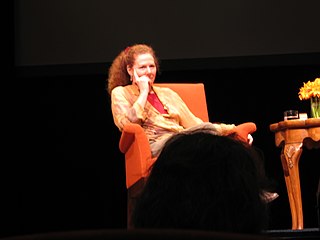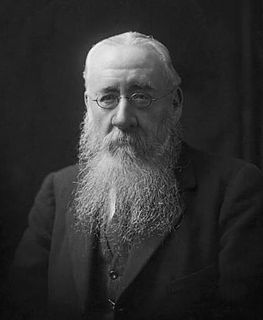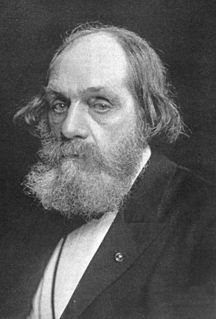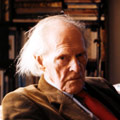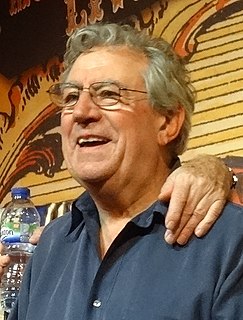Top 45 Chaucer Quotes & Sayings
Explore popular Chaucer quotes.
Last updated on April 14, 2025.
The slight, the facile and the merely self-glorifying tend to drop away over the centuries, and what we are left with is the bedrock: Homer and Milton, the Greek tragedian and Shakespeare, Chaucer and Cervantes and Swift, Dostoyevsky and Tolstoy and James and Conrad. Time does not make their voices fainter, on the contrary, it reinforces our sense of their truth-telling capacity.
I have these guilts about never having read Chaucer but I was talked out of learning Early Anglo-Saxon / Middle English by a friend who had to take it for her Ph.D. They told her to write an essay in Early Anglo-Saxon on any-subject-of-her-own-choosing. “Which is all very well,” she said bitterly, “but the only essay subject you can find enough Early Anglo-Saxon words for is ‘How to Slaughter a Thousand Men in a Mead Hall’.
What a contrast between the stern and desolate poetry of Ossian, and that of Chaucer, and even of Shakespeare and Milton, much more of Dryden, and Pope, and Gray! Our summer of English poetry, like the Greek and Latin before it, seems well advanced towards its fall, and laden with the fruit and foliage of the season, with bright autumnal tints, but soon the winter will scatter its myriad clustering and shading leaves, and leave only a few desolate and fibrous boughs to sustain the snow and rime, and creak in the blasts of age.
Without those forerunners, Jane Austen and the Brontes and George Eliot could no more have written than Shakespeare could have written without Marlowe, or Marlowe without Chaucer, or Chaucer without those forgotten poets who paved the ways and tamed the natural savagery of the tongue. For masterpieces are not single and solitary births; they are the outcome of many years of thinking in common, of thinking by the body of the people, so that the experience of the mass is behind the single voice.
First impressions of mediaeval life are usually coloured by the courtly romances of Malory and his later refiners. Chaucer brings us down to reality, but his people belong to a prosperous middle-class world, on holiday and in holiday mood. Piers Plowman stands alone as a revelation of the ignorance and misery of the lower classes, whose multiplied grievances came to a head in the Peasants' Revolt of 1381.
The church itself has got to go outside of its own borders and carry the gospel to ev'ry creature, or it is no church of Christ; and any mutual improvement club which thinks that by reading its Shakspearo, or by acting its pretty tableaux, or by having. this or that little reading from Spenser and from Chaucer, it is going to lift itself up into any higher order of culture or life, is wholly mistaken, unless as an essential part of its duty, it goes out into the world, finds those that are falling down, and lifts them up to the majesty of freemen, who are sons of God.
I walk out into a nature such as the old prophets and poets Menu, Moses, Homer, Chaucer, walked in. You may name it America, but it is not America. Neither Americus Vespucius, nor Columbus, nor the rest were the discoverers of it. There is a truer account of it in Mythology than in any history of America so called that I have seen.
The true use of Shakespeare or of Cervantes, of Homer or of Dante, of Chaucer or of Rabelais, is to augment one's own growing inner self. . . . The mind's dialogue with itself is not primarily a social reality. All that the Western Canon can bring one is the proper use of one's own solitude, that solitude whose final form is one's confrontation with one's own mortality.
English literature, from the days of the minstrels to the Lake Poets,--Chaucer and Spenser and Milton, and even Shakespeare, included,--breathes no quite fresh and, in this sense, wild strain. It is an essentially tame and civilized literature, reflecting Greece and Rome. Her wildness is a greenwood, her wild man a Robin Hood. There is plenty of genial love of Nature, but not so much of Nature herself. Her chronicles inform us when her wild animals, but not the wild man in her, became extinct.
We possess the Canon because we are mortal and also rather belated. There is only so much time, and time must have a stop, while there is more to read than there ever was before. From the Yahwist and Homer to Freud, Kafka, and Beckett is a journey of nearly three millennia. Since that voyage goes past harbors as infinite as Dante, Chaucer, Montaigne, Shakespeare, and Tolstoy, all of whom amply compensate a lifetime's rereadings, we are in the pragmatic dilemma of excluding something else each time we read or reread extensively.
In the final exam in the Chaucer course we were asked why he used certain verbal devices, certain adjectives, why he had certain characters behave in certain ways. And I wrote, 'I don't think Chaucer had any idea why he did any of these things. That isn't the way people write.' I believe this as strongly now as I did then. Most of what is best in writing isn't done deliberately.
Why do I feel so exercised about what we think of the people of the Middle Ages? ... I guess it's because so many of their voices are ringing vibrantly in my ears - Chaucer's, Boccaccio's, Henry Knighton's, Thomas Walsingham's. Froissart's, Jean Creton's... writers and contemporary historians of the period who seem to me just as individual, just as alive as we are today. We need to get to know these folk better in order to know who we are ourselves.
Soul of the age! The applause, delight, the wonder of our stage! My Shakespeare , rise; I will not lodge thee by Chaucer or Spenser , or bid Beaumont lie A little further, to make thee a room; Thou art a monument, without a tomb, And art alive still, while thy book doth live, And we have wits to read , and praise to give .




